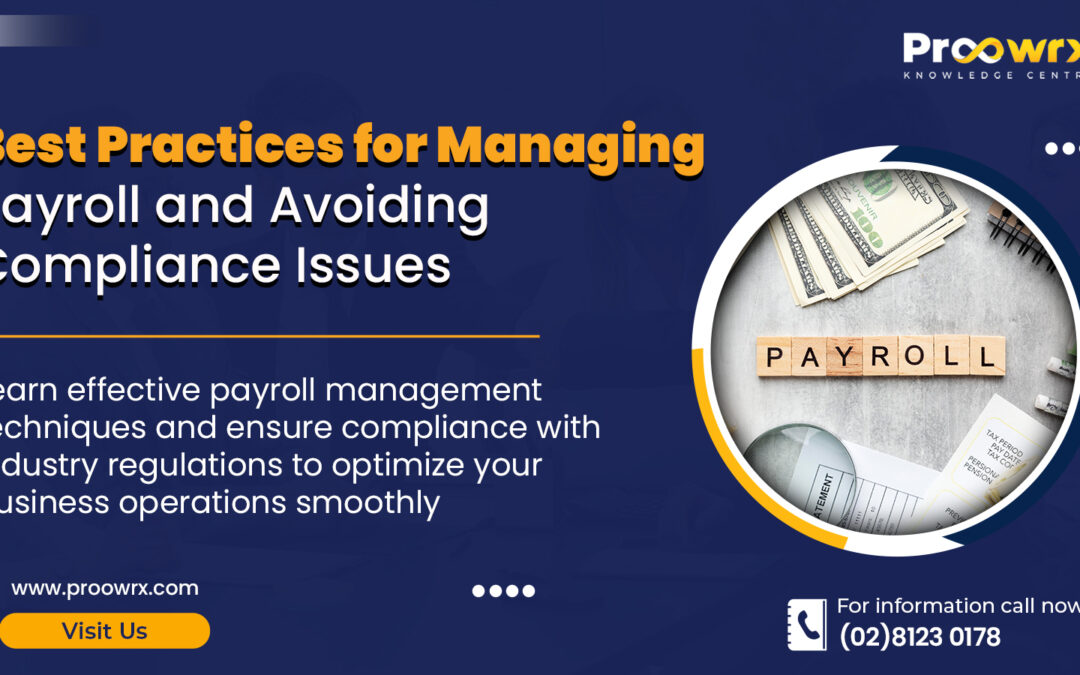Managing payroll is one of the most important yet challenging tasks for any business. Payroll involves much more than just paying employees; it requires tracking hours worked, calculating wages, ensuring accurate tax deductions, and staying compliant with a myriad of regulations. Mistakes, even small ones, can lead to big problems like unhappy employees, financial losses, and penalties from regulatory bodies. For businesses trying to operate efficiently, ensuring that payroll is handled correctly and compliance is maintained is not just a necessity—it’s vital to the business’s success.
This blog will guide you through best practices for managing payroll effectively while keeping compliance issues at bay. We’ll keep the content easy to understand and practical, so you can apply these tips in your business without feeling overwhelmed.
Understanding Payroll Management
Payroll management is more than just cutting checks or processing direct deposits. It includes tracking employee hours, calculating wages, deducting taxes, and ensuring that everyone is paid accurately and on time. But that’s not all—payroll management also involves staying compliant with various regulations, which can vary by state or country.
In Australia, payroll compliance is particularly important due to the country’s complex tax laws and employment regulations. Mistakes in payroll processing can lead to severe consequences, including fines, legal action, and damage to your company’s reputation. Therefore, it’s crucial to implement best practices that will not only make payroll management more efficient but also ensure compliance with the law.
Best Practices for Efficient Payroll Management
Let’s explore some practical tips that can help you manage payroll more efficiently:
1. Automate Payroll Processes
One of the most effective ways to manage payroll efficiently is to automate as much of the process as possible. Automation can significantly reduce the chances of errors, save time, and improve accuracy. Using payroll software, you can automate tasks like calculating wages, deducting taxes, and generating pay stubs. This makes the payroll process faster and more reliable.
In Australia, there are several payroll software options available that are designed to meet the specific needs of Australian businesses. These tools can help you stay compliant with Australian tax laws, manage superannuation contributions, and ensure that your payroll records are accurate and up to date. By automating payroll processes, you can focus on other important aspects of your business while ensuring that payroll is handled efficiently.
2. Maintain Accurate Employee Records
Accurate employee records are essential for effective payroll management. These records should include personal details, tax information, employment contracts, and any other relevant data. Keeping employee records up to date is crucial for ensuring that payroll is processed correctly and that the right amount of taxes is withheld.
Regularly reviewing and updating employee records can help you avoid mistakes that could lead to compliance issues. For example, if an employee’s tax information changes and you fail to update their records, you could end up withholding the wrong amount of taxes, which could result in penalties. By maintaining accurate records, you can ensure that your payroll processes are smooth and compliant with the law.
3. Conduct Regular Payroll Audits
Payroll audits are an essential part of managing payroll effectively. Regular audits can help you identify and correct issues before they become serious problems. During a payroll audit, you should review payroll records, check that all taxes have been paid correctly, and ensure that all employees have been paid the correct amounts.
Audits can also help you identify any discrepancies or errors in your payroll processes. For example, you might discover that an employee was overpaid or underpaid, or that certain tax deductions were calculated incorrectly. By conducting regular payroll audits, you can catch these issues early and take corrective action before they lead to compliance problems or financial losses.
4. Stay Updated on Tax Laws and Regulations
Tax laws and regulations are constantly changing, and it’s important to stay informed about these changes to ensure compliance. In Australia, tax laws can be particularly complex, and staying up to date with the latest regulations is crucial for avoiding penalties and legal issues.
To stay informed, consider subscribing to newsletters from reputable sources, attending seminars or workshops on payroll and tax compliance, and regularly checking updates from the Australian Taxation Office (ATO). Staying informed about tax laws and regulations will help you ensure that your payroll processes are compliant and that you’re not caught off guard by any changes in the law.
5. Establish a Consistent Payroll Schedule
A consistent payroll schedule is important for both your employees and your business. For employees, a regular payroll schedule provides predictability and allows them to plan their finances accordingly. For your business, a consistent schedule simplifies the payroll process and makes it easier to manage.
When establishing a payroll schedule, consider the needs of your employees and the requirements of your business. Some businesses prefer to process payroll weekly, while others opt for a bi-weekly or monthly schedule. Whatever schedule you choose, make sure it’s consistent and communicated clearly to your employees. A predictable payroll schedule will help you avoid confusion and ensure that payroll is processed smoothly.
6. Provide Payroll Training for Staff
Even with automation and payroll software, having a well-trained payroll team is essential. Your payroll staff should be knowledgeable about the latest payroll software, tax laws, and best practices. Regular training sessions can help your team stay sharp and capable of handling any payroll challenges that arise.
In addition to technical training, it’s also important to provide training on compliance and regulatory requirements. Make sure your payroll staff understands the importance of staying compliant with tax laws, wage regulations, and other legal requirements. By providing comprehensive training, you can ensure that your payroll team is equipped to manage payroll effectively and avoid compliance issues.
Ensuring Compliance with Payroll Regulations
Compliance is a key aspect of payroll management, and failing to comply with regulations can result in hefty fines or other penalties. Here’s how to ensure that your payroll practices stay on the right side of the law:
1. Understand Compliance Requirements
Different regions have different compliance requirements, and it’s important to understand what applies to your business. In Australia, compliance requirements may include minimum wage laws, overtime rules, tax obligations, and superannuation contributions. Familiarize yourself with these requirements and make sure your payroll practices adhere to them.
For example, Australia has specific rules regarding the payment of superannuation, which is a mandatory retirement savings contribution. Failing to comply with superannuation requirements can result in significant penalties. By understanding and adhering to these compliance requirements, you can protect your business from legal and financial risks.
2. Implement Internal Controls
Internal controls are procedures that help ensure the accuracy and integrity of payroll data. Implementing strong internal controls can help prevent errors, reduce the risk of fraud, and ensure compliance with regulations.
Some examples of internal controls include requiring dual approvals for payroll changes, separating duties between payroll preparation and approval, and regularly reviewing payroll reports. These controls help create a system of checks and balances that can catch errors or discrepancies before they become serious issues. By implementing internal controls, you can strengthen your payroll processes and maintain compliance with the law.
3. Maintain Proper Documentation
Proper documentation is essential for compliance with payroll regulations. This includes maintaining detailed records of all payroll transactions, tax filings, employee communications, and any other relevant documentation.
In the event of an audit or legal inquiry, having well-organized and accurate records can protect your business and provide evidence of compliance. Proper documentation also helps you track payroll expenses, monitor employee payments, and ensure that all tax obligations are met. Make it a habit to keep thorough records of all payroll activities, and store them securely to protect sensitive information.
Using Technology to Support Compliance
Technology can be a powerful tool for managing payroll and ensuring compliance. Here are a few ways to use technology to your advantage:
1. Use Compliance-Focused Payroll Software
Many modern payroll software options are designed with compliance in mind. These programs can automatically update tax rates, generate compliance reports, and alert you to potential issues before they become problems. When choosing payroll software, look for features that support compliance, such as automated tax filing, compliance checklists, and real-time updates.
In Australia, payroll software that integrates with the ATO’s Single Touch Payroll (STP) system can help you stay compliant with reporting requirements. STP requires businesses to report employee payments, tax withholdings, and superannuation contributions to the ATO each time they process payroll. Using software that supports STP can simplify the reporting process and help you stay compliant.
2. Integrate Payroll with Other Business Systems
Integrating your payroll system with other business systems, such as HR or accounting software, can help ensure consistency and accuracy across your organization. Integration allows for seamless data transfer between systems, reducing the risk of errors and helping to keep everything aligned with compliance requirements.
For example, integrating payroll with your HR system can ensure that employee records are always up to date, while integration with accounting software can help you track payroll expenses and manage cash flow more effectively. By integrating payroll with other business systems, you can create a more efficient and compliant payroll process.
Common Payroll Compliance Mistakes to Avoid
While it’s important to know what to do, it’s also helpful to know what to avoid. Here are some common payroll compliance mistakes that can cause headaches:
1. Misclassifying Employees
One common mistake is misclassifying employees as independent contractors. This can lead to underpayment of taxes and result in penalties. Make sure you understand the difference between employees and contractors, and classify them correctly.
Misclassifying employees can have serious consequences, including legal action and financial penalties. In Australia, the Fair Work Ombudsman has strict rules about employee classification, and businesses that misclassify workers can face significant fines. To avoid this mistake, ensure that you correctly classify all workers according to the relevant employment laws.
2. Failing to Pay Overtime
Overtime laws can be complex, and failing to pay employees the correct overtime rate is a common compliance issue. Ensure that your payroll system is set up to calculate and pay overtime correctly according to the laws in your region.
In Australia, employees are entitled to overtime pay if they work more than the standard hours specified in their award or agreement. Failing to pay overtime can result in legal action and fines from the Fair Work Ombudsman. To avoid this mistake, make sure your payroll system accurately tracks employee hours and calculates overtime pay in accordance with the law.
3. Missing Payroll Deadlines
Missing payroll deadlines can result in fines and upset employees. Set reminders and have a process in place to ensure that payroll is processed on time, every time.
In Australia, employers are required to pay employees on a regular basis, as specified in their employment contracts. Missing payroll deadlines can not only lead to penalties but also damage employee morale and trust. To avoid this mistake, establish a consistent payroll schedule, set up automated reminders, and ensure that your payroll team is prepared to meet deadlines.
Conclusion
Managing payroll is no small task, but by following these best practices, you can simplify the process and avoid compliance issues. Whether it’s automating processes, keeping records up to date, staying informed about regulations, or training your team regularly, these steps can help you manage payroll with confidence. By focusing on accuracy, compliance, and efficiency, you can create a payroll system that keeps both your business and your employees satisfied.
At Proowrx, we specialize in outsourcing solutions tailored to meet your payroll needs. If you’re ready to enhance your payroll process and ensure compliance, book a discovery call with us today and let’s explore how we can support your business.

